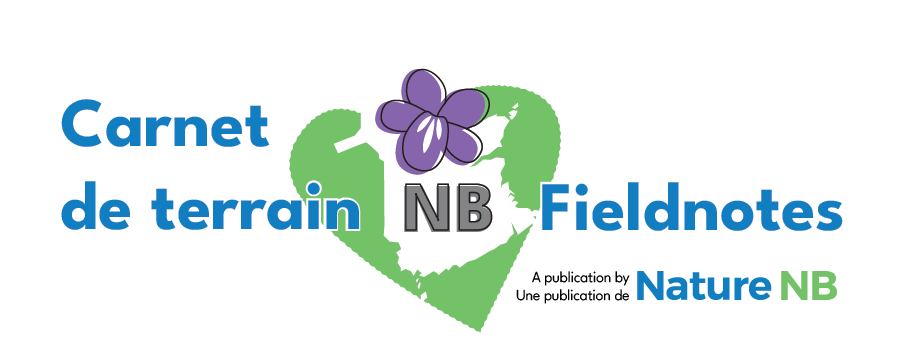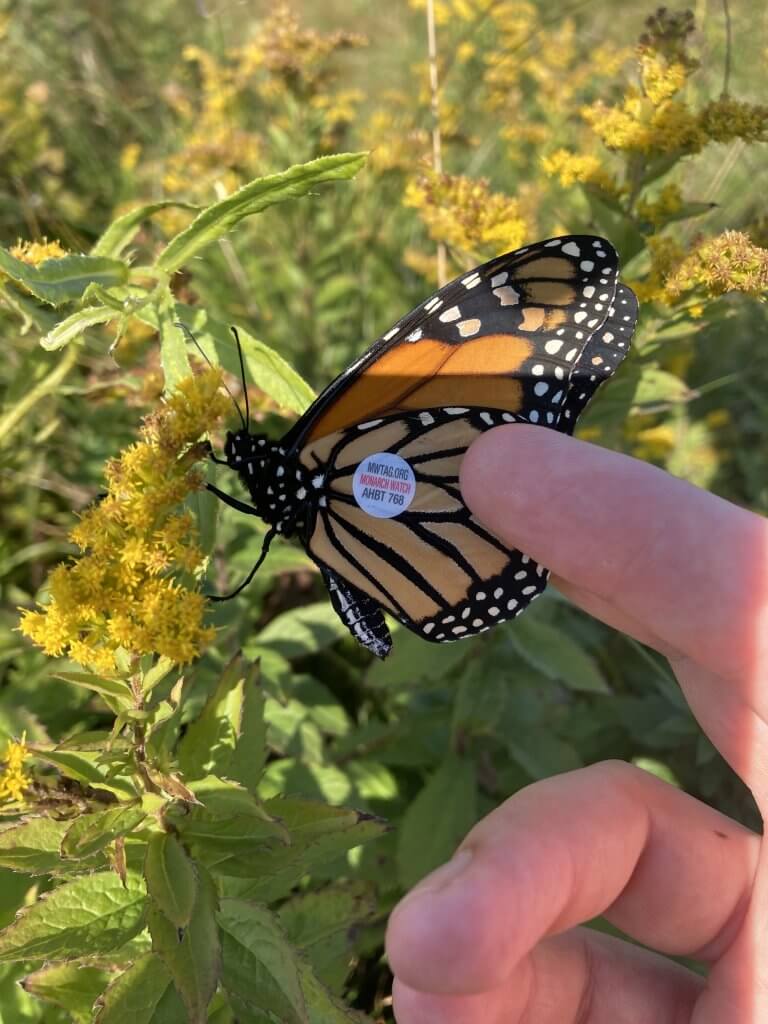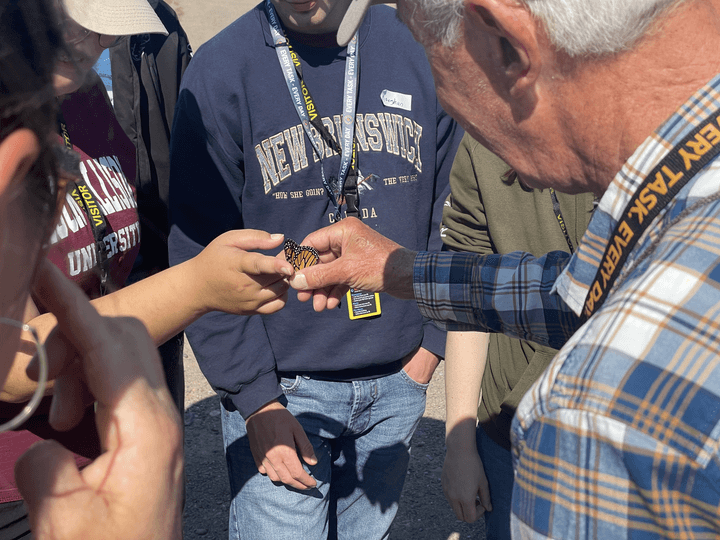
A Pollinator Garden and a Great Partnership with Mount Allison University
This past fall, our team was fortunate to kick off an exciting partnership with Dr. Emily Austen, Assistant Professor with Mount Allison University Biology Department and Experiential Learning & Career Development office. It all started last spring when we approached Dr. Austen to help us out with some of our native plant seed work. As many of our readers know, when we get excited about things, new projects quickly take form. For this edition of NB Fieldnotes, our Program Director Adam Cheeseman asked our partners to come up with a series of questions reflecting on their experiences.
Adam Cheeseman, Program Director at Nature NB
When we met with Dr. Austen, we asked ourselves: what if we worked together to offer a course where Biology students could learn about Nature NB’s pollinator and Monarchs program, while contributing to real-world conservation efforts in New Brunswick?
As asters and goldenrod started to bloom, our team began meeting with students in the newly launched Applied Native Plant and Pollinator Conservation course. Engaging with the class was a rewarding and refreshing experience, as the students brought many new ideas, content, and passion to our work. With help from students, we bolstered our education resources, Monarch tagging efforts, the Seed Sitters Club, and much more. We were very fortunate to partner with the Saint John Naturalists’ Club and NB Power to bring Dr. Austen and the students to the Point Lepreau Bird Observatory to study and tag Monarch butterflies in the field.

As the class winded down, we started talking about how to keep the momentum going with this great work. We soon learned about an internship program offered by the Experiential Learning team, which allowed us to hire two students from the course, Keeghan and Hannah, to work with us this past winter. Keeghan and Hannah worked closely with the team to help prepare for our pollinator garden projects, funding proposals, ecological connectivity projects, and more!
As the spring progresses and we prepare for a new season of helping pollinators, we are excited to see this partnership continue!

Rebecca Leaman, Director of Experiential Learning and Career Development at Mount Allison
The Internship Program, managed by the office of Experiential Learning & Career Development at Mount Allison University, is an interdisciplinary program allowing students from all fields to participate in work-integrated learning activities with community partners. This allows students to take the academic learning they receive in the classroom and apply it in a workplace setting, contributing to their organization’s goals, and strengthening their skills. The part-time internships with Nature NB were an excellent example of a partnership that expanded from a course-based experiential learning project into a paid work placement for two students who continue to do amazing work. We were so pleased to support this opportunity with Nature NB.
Dr. Emily Austen, Assistant Professor at Mount Allison:
The “Plant & Pollinator Conservation” course, co-taught with Nature NB, was a fantastic learning experience for the students involved. Not only did they learn about the biology of pollination, threats to plants and pollinators, and strategies for conservation, but they also learned about (and developed!) skills needed for real-world work outside of the classroom. Students were extra motivated knowing that their work had a larger audience beyond the university walls. And working with Nature NB to plan and teach this course was an absolute joy for me! Adam, Francie, and Sam brought fresh ideas to the course, and the end product was so much better than anything I could have done on my own.
We asked our two interns five questions. The first question was :
What are you studying at Mount Allison? What drew you to Dr. Austen’s plants and pollinators course?
Hannah:
I was studying Biology and Environmental Science at Mount Allison University. This was my final year, so I will be graduating (with honours!) soon after writing this.
For the past year, I have been doing undergraduate research on wild bees in constructed wetlands supervised by Dr. Austen. Naturally, I was quite interested in completing a course that was so directly related to my interests and was also taught by one of my favourite professors. I had taken several classes with her throughout the years, including a native flora course that had overlapping themes, so it was a course I was excited about.
Keeghan:
I am studying to get an honours in biology degree from Mount Allison. Early in my degree I took a plant biology course with Dr. Austen that I found to be incredibly fascinating. I think that, while animals are cool, plants represent a significant portion of our environment that are so easily overlooked. They’re one of the more alien types of organisms that occupy this planet. Unfortunately, during my time at school there was a limited offering of plant biology courses, so I switched my focus to ecology and conservation biology, which soon became my favourite subject. When I saw that Dr. Austen was offering a course that would combine the two subjects, I knew I had to enroll in it.
What was one reason that you were interested in working with Nature NB after the course ended?
Hannah:
One major reason I was interested in working with Nature NB is that I wanted more hands-on experience in the environmental non-profit sector. I really enjoyed the sort of work I did during the plants and pollinators course (e.g. the Mayor’s Monarch Pledge), and I felt the sort of work Nature NB does is something I would be interested in long-term.
Keeghan:
I’ve done internships with non-profit conservation organisations in the past that I found to be very fulfilling. The environment that these sorts of organisations cultivate is my perfect balance of dedication, diversity, and casual-ness. The fact that it was possible for an organisation like Nature NB to partner with a course was something I had never considered to be possible. It was such a pleasure to come near that positive environment again. The experience offered by this internship to not only re-enter that non-profit space more fully but also work on a plant conservation project was what drew me to the internship.
What was something new you were exposed to or learned during this internship?
Hannah:
I have never had the opportunity to lead a project like the Picaroons pollinator garden, where the project will have a meaningful and noticeable impact on the local pollinators and community. I helped research and source the best plants, aided in creating a workable budget, and designed the gardens (creating many iterations).
Keeghan:
The initial project we were brought on to work on, the pollinator garden in Fredericton, required many hours of research to determine how to lay out the garden. There were a lot of questions to be answered: how much soil will we need, what will the cost be, how much space can we occupy, will there be enough sun exposure, or too much; will these plants be flood resistant? I learned a lot about not just landscaping, but the plants that will be included in the garden. One of the more significant aspects of the garden was how the plants would interact with each other, when they would bloom, and if they would support each other and a diverse population of pollinators; all of this was very new to me and made working on the project very exciting.
What is one lesson you’ll take from this experience?
Hannah:
One lesson I believe I learned is that being busy isn’t necessarily a bad thing. Along with doing this internship, I was also doing my honours thesis, working as a teaching assistant, all of my classes, as well as two conferences. I always seemed to have a lot to do all the time, but I love the path I chose for myself and I don’t regret any part of it.
Keeghan:
Everything takes longer than you expect it to if you don’t have a plan. So many times I’ve gone into an apparently small project or task that, in my mind, will take at most an hour, only for it to become a three or four hour ordeal. A little planning and preparation, familiarising yourself with the subject matter, asking questions, and having a direction will go a long, long way to improving your work efficiency and the quality of that work. This is especially true when it’s a new field or type of project that you’ve never worked on before, like a grant. Things are never as straight-forward as they appear to be.
What are you up to next?
Hannah:
I hope to complete my masters degree, continuing research on wild bees elsewhere in Canada. Specfically I would like to focus on kleptoparasitic bees such as the genus Nomada. However, I am always interested in researching other understudied groups of wild bees as well.
Keeghan:
Over the summer of 2025 I’ll be doing research with the Riley Lab on painted turtles in the Grand Lake region. I’m very excited to see where that new experience takes me and what the next academic year holds in store. I’ve always wanted to do research, so finally getting this opportunity has been a dream-come-true!
Keep yourself updated with our pollinator garden projects with these new Short videos on Youtube!




